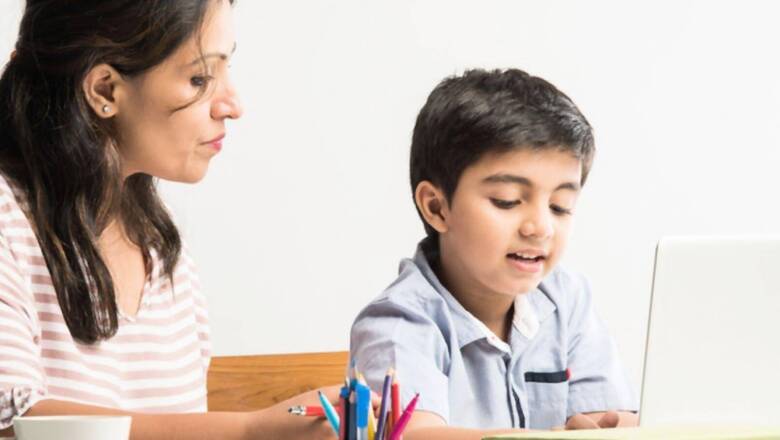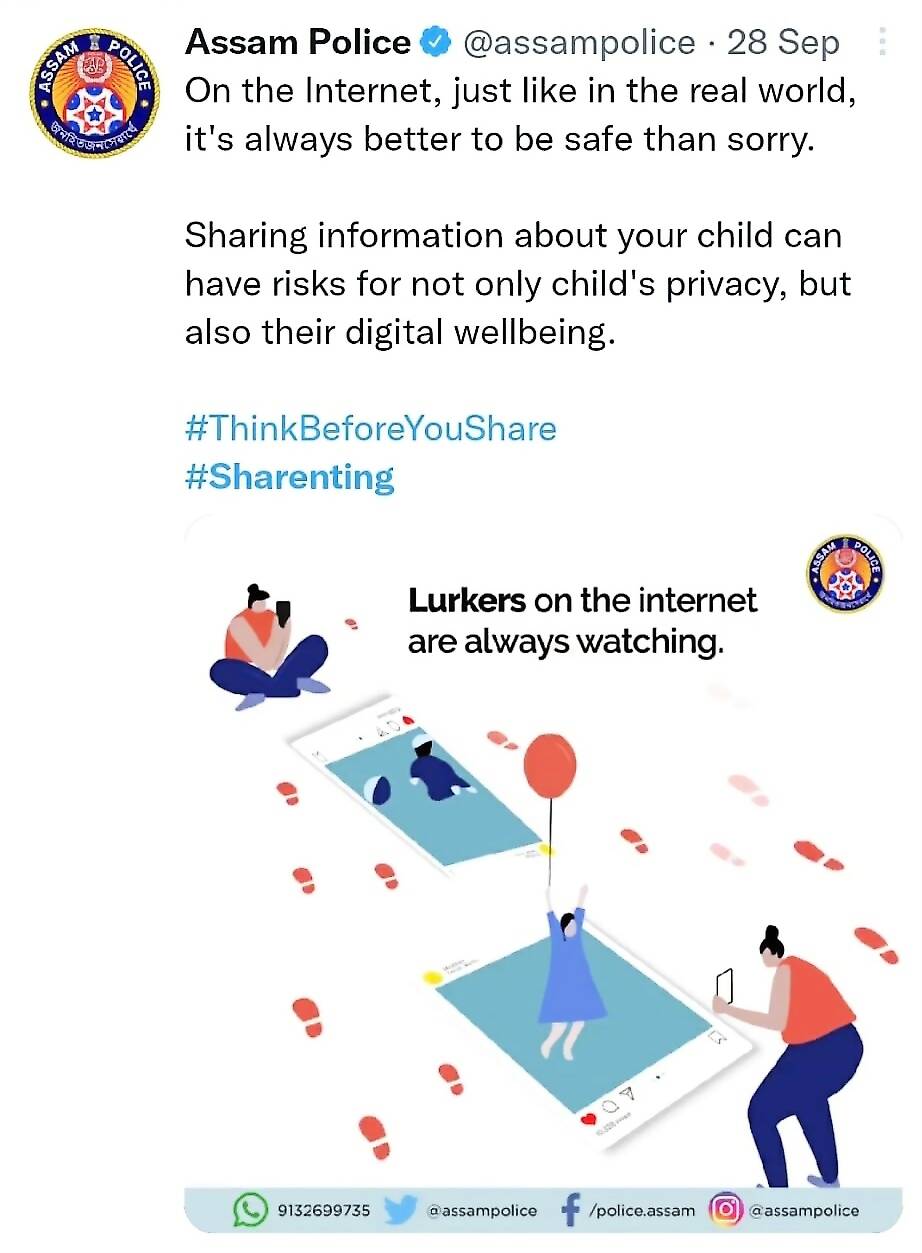
views
In a dusty corner of everyone’s cupboard, lies the sepia-toned museum of memories — the family photo album, the living embodiment of a nostalgic past. The photo album, among other beautiful moments, also carries some embarrassing pictures from childhood. For a pre-Internet generation, thankfully, those dilapidated polaroid prints rarely saw the light of the day, and even when they did, it was in a private gathering.
For today’s children, things are different. The advent of digital culture has transformed how parents document their child’s life and end up being a ‘Sharent’.
The term ‘Sharenting’ was coined by Wall Street Journal writer Steven Leckart in the early 2010s. A portmanteau of ‘oversharing’ and ‘parenting’, it is the phenomenon in which parents overshare content about their children on internet platforms. Today, kids are making their debut on social media before their first words. Studies show that children will have more than 1,000 pictures of them on social media before they turn 5. From Ultrasound snapshots to first birthday and first day at school, the parents’ social media feed is a digital dossier of their child’s life, in full public view. In most cases, parents end up sharing a lot of sensitive information, albeit unintentionally. A seemingly innocuous Facebook post, shared in a moment of pride and happiness can reveal information such as a child’s name, birth date, and/or school name, which can all be misused by people with ulterior motives.
Addressing the Elephant in the Room
Babies, like cute little elephant calves, rule the Internet.
The ethereal and cute-as-a-button visuals attract social validation in the form of likes and comments. This is one of the primary motivators for parents going overboard when it comes to sharing information about their child on social media. In psychological parlance, the ‘Positive Intermittent Reinforcement’ drives the social media behaviour of parents, wherein, parents unwittingly end up risking the digital wellbeing of their child. Oversharing details about children could increase the likelihood of identity theft and fraud, and put their privacy at risk. Parents need to acknowledge their child’s privacy. Sharing Personally Identifiable Information (PII) about a child can have serious consequences. According to a study by Barclays, by 2030, Sharenting could account for up to 7 million cases of identity theft costing £667million per year. Today, children are increasingly falling victim to ‘Online Grooming’, a term used to describe the tactics an adult deploys through the internet to sexually exploit children.
Oversharing your children’s life on social media could also give easy access to cyberbullies, criminals, and stalkers. This can also lead to what researchers call ‘Digital Kidnapping’, a new phenomenon wherein, cybercriminals steal child’s identity, posing as them, or posing as their parents. A quick glance at hashtags such as #adoptionrp, #orphanrp, and #babyrp can reveal the dark side of this extremely scary phenomenon. Inappropriate or embarrassing details or pictures of your child may seem cute, but these details can not only embarrass a child in later life, but also seriously harm him or her online reputation, in the future.
Apart from the children’s safety and privacy concerns, sharenting also robs them of narrating their own stories. Imagine growing up and realising that your parents’ social media accounts are a public testament to your life moments on the Internet, without you having any say in it. Being a parent in today’s digitally connected world calls for sensible use of social media and mandates you to be a responsible user. These technological leaps have augmented additional layers in the traditional parenting paradigm.
To be or not to be (a Sharent)
So, does it mean parents should follow a radio silence on social media as far as their children are concerned?
The answer to this moral and ethical quandary of Digital Parents is not simple. Besides, it’s still an evolving concept and there’s no clear SOP, which can be followed. Sharenting is perhaps a classic case of what behaviour analysts call a ‘Collingridge dilemma’, which says the impact of technology cannot be easily predicted until the technology is extensively developed and widely used. There’s very limited awareness about Sharenting and people are not even aware of its existence. That’s why raising awareness is the key. Assam Police’s campaign on ‘Sharenting’ is an attempt to sensitise parents on the perils of sharing sensitive details of their children on social media. It’s perhaps one of the first of its kind campaigns, by any police department in India.

Social media, if used responsibly, is a great source of connecting with our loved ones. However, as a general rule of thumb, parents should draw the line when it comes to oversharing and refrain from sharing any personal information which can be misused by anyone.
The Way Forward
While choosing what goes public and what remains private is a personal decision, there are, however, some basic safety measures, which every parent should consider while sharing information about their child on the Internet.
● Think Before You Post: Take a second and look at the picture before you post it. Ensure that you are not revealing any personal details like a house address or school name.
● Review Privacy Settings on Social Media: Learn to use the privacy and security settings on social networks. Control what goes public and what stays private, within a closed group, to ensure your child’s digital well-being.
● Ask for Permission: If the picture(s) feature your child’s friends or other kids, ask their parents/guardians before posting it online.
● Respect Your Child’s Privacy and Dignity: Documenting, albeit unintentionally, embarrassing or inappropriate moments can embarrass or upset your child in the future.
● Watch Your Child’s Digital Footprints: Avoid sharing PII (personally identifying information) as much as possible. Sharing information on the Internet creates digital ‘footprints’ which can be misused by Cybercriminals in the future.
● Stay Anonymous: If you are seeking online help regarding Anxiety, AHDH, or any other ailment for your child, interact anonymously to safeguard your child’s privacy.
● It’s Not About You, It’s About Them: The charm of those Facebook Likes & Comments is irresistible, but always remember, your child is not a social media prop.
● Influencer & Vlogger Parents: If you are a Vlogger Parent, the risks associated with Sharenting, such as Identity Theft and Digital Kidnapping, are even greater.
● Keep It Vague: While sharing a birthday or ‘first-day-at-school’ post, keep the information and the visuals vague. Omit details like your child’s full name, date of birth, and school name.
● Limit Your Social Media Network: Consider creating a closed group on social media networks with restricted access for close family members and friends.
The increasingly tech augmented universe is constantly evolving and thus, it’s imperative that parents adapt to new rules of the game. In addition to their existing responsibilities, parents of the modern world also need to safeguard and protect their children’s digital footprints. While it’s true that when it comes to parenting, no one is ever quite ready; everyone is always caught off guard, it’s the beauty of being a parent, that keeps us on our toes.
After all, being a responsible parent in the digital age is not child’s play.
Harmeet Singh, IPS – Commissioner of Police Guwahati, In charge, Assam Police Smart Social Media Centre – ‘Nagrik Mitra’ & Assam Police Sishu Mitra Programme.
Harmeet Singh, IPS, Commissioner of Police Guwahati, in charge, Assam Police Smart Social Media Centre – ‘Nagrik Mitra’ & Assam Police Sishu Mitra Programme, and Salik Khan is Creative Consultant, Assam Police Smart Social Media Centre. The views expressed in this article are those of the authors and do not represent the stand of this publication.
Read all the Latest Opinions here




















Comments
0 comment